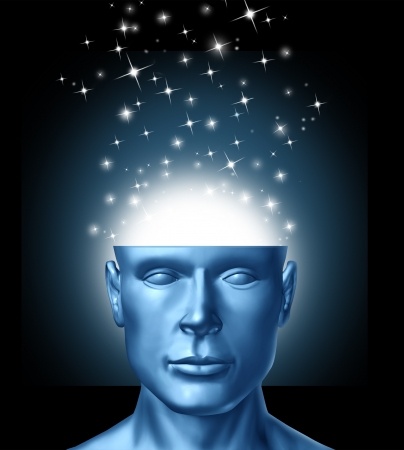"The challenge of understanding the nature of consciousness requires both scientific rigor and openness to other complementary approaches."
Introduction
What is consciousness, and what is its true nature? Can it be studied, and must this study necessarily be the sole domain of science? These are the fundamental questions this article seeks to answer. But to understand the nature of consciousness, it is first necessary to define it. Indeed, the terms "conscious" and "consciousness" cover a variety of mental phenomena, and the scientific literature reveals a lack of consensus as to their precise meaning.
Should we speak of activation of consciousness, as Rosenthal (1986, 1996) suggests, by focusing on perception, memory or attention – traditional objects of study in cognitive psychology and neuroscience? Or are we talking about the qualitative states called qualia, these phenomenal dimensions accessible through introspection? Consciousness could also be considered as phenomenal, that is to say as the global structure of experience, well beyond the sole sensory data.
Whichever option is chosen, the subjective nature of consciousness makes its study delicate and calls for a double requirement: scientific rigor on the one hand, and openness to other modes of knowledge, notably those from spiritual traditions, on the other.
Defining the nature of consciousness: a necessary prerequisite
The word conscience comes from Latin awareness, literally meaning “shared knowledge,” and refers to an immediate, intuitive, or reflective knowledge that each person has of themselves and the world. It thus presents itself as a personal feeling, a subjective experience that is universally accessible but irreducibly singular.
This radical subjectivity poses a major methodological difficulty for its study: the researcher is both subject and object of his own investigation. The study of consciousness therefore requires increased epistemological vigilance and a continuous reflexive stance.
The contribution of science to the study of consciousness
Science, as a discipline based on rigorous methods of knowledge production, aims to establish objective and verifiable facts. In psychology, as elsewhere, this involves posing a specific research question, formulating hypotheses, collecting data, and analyzing the results. Neuroscience and cognitive psychology have thus enabled significant advances in understanding the mechanisms related to attention, perception, and memory.
Experiments such as those on blindsight (blindsight) have revealed the existence of conscious processes beyond reflexive awareness alone. According to Chalmers (1995), these advances address the "easy problems" of consciousness, but leave unresolved the "hard problem": how can neural activity give rise to subjective experience?
Consciousness can nevertheless be studied scientifically from three perspectives: phenomenological, neurophysiological, and behavioral. But all these approaches fail to explain the very nature of consciousness. As Nagel (2012) points out, the physical sciences describe organisms in space-time, but cannot describe their subjective experience.
The limits of the scientific approach
Despite its contributions, science is reaching its limits when it comes to understanding the nature of consciousness. The field remains fragmented, and scientific research, often focused on narrow subjects, struggles to encompass the entire phenomenon.
Metzinger (2000) points out that neuroscience seeks to identify the neural correlates of consciousness without being able to explain why or how neural activity becomes subjective experience. Other questions, such as the unity of sensory experience or the adaptive role of consciousness, remain unanswered.
More fundamentally, consciousness can only be approached through experience itself. If all knowledge passes through consciousness, we must first understand its conditions, which implies knowing the nature of the human mind. This paradox—studying consciousness with consciousness—makes any complete neutrality of the researcher illusory.
The need for a paradigm shift
Added to these limitations is the need to complement the scientific method with other perspectives. Transpersonal psychology, for example, allows us to consider consciousness as non-local, and is interested in extraordinary experiences such as NDEs (near-death experiences), altered states of consciousness, and meditation.
As Lancaster (2004) suggests, consciousness may be a fundamental property of the universe, not just an emanation of the brain. Based on this assumption, consciousness would be primary, with matter being only one manifestation of it.
From this perspective, a paradigm shift is essential: considering experience as the criterion of reality, and no longer just material observation. Spiritual traditions—Buddhism, shamanism, Kabbalah—can then enrich our understanding of consciousness.
Towards an integrative approach
Reports of spiritual or transcendental experiences, such as those collected by Alister Hardy in 1969, show that consciousness can open one to a feeling of guidance, peace, or fulfillment. These experiences are not a pathology, but a form of spiritual intelligence now recognized in certain academic fields.
Exploring these aspects of consciousness is essential to understanding the need for transcendence, the quest for meaning, and paths to well-being or healing. The contributions of humanistic psychology and mystical traditions offer valuable resources here.
Conclusion
Scientific rigor is essential to the study of consciousness, particularly to ensure a research ethic based on axiological neutrality. But this rigor must be accompanied by an openness to other forms of knowledge.
As Popper suggested in his time, it is perhaps time to review our dominant paradigm, by integrating the contributions of disciplines that are still marginal, but which offer promising avenues for approaching the profound nature of consciousness.
Bibliography
Baruss, I. (2008). Beliefs about consciousness and reality: Clarification of the confusion concerning consciousness. Journal of Consciousness Studies, 15(10-11), 277-292.
Baruss, I. (2012). What We Can Learn about Consciousness from Altered States of Consciousness. Journal of Consciousness Exploration & Research, 3(7), 805-819.
Barušs, I. & Mossbridge, J. (2016). Transcendent mind: Rethinking the science of consciousness. American Psychological Association.
Chalmers, D.J. (1995). Facing up to the problem of consciousness. Journal of consciousness studies, 2(3), 200-219.
Hay, D. (1990), Religious Experience Today, London, Mobray
Lancaster, B.L. (2004). Approaches to consciousness: The marriage of science and mysticism. Macmillan International Higher Education.
Metzinger, T. (Ed.). (2000). Neural correlates of consciousness: Empirical and conceptual questions. MIT press.
Nagel, T. (2012). Mind and cosmos. Why the materialist Neo-Darwinian conception of nature is almost certainly false. Oxford: Oxford University Press.
Popper, K. R. (1963). Science as falsification. Conjectures and refutations, 1, 33-39.
Schwartz, S.A. (2015). Six Protocols, Neuroscience, and Near Death: An Emerging Paradigm Incorporating Nonlocal Consciousness. Explore, Vol. 11, No. 4
Van Gulick, Robert, Consciousness, The Stanford Encyclopaedia of Philosophy (Spring 2018 Edition)



